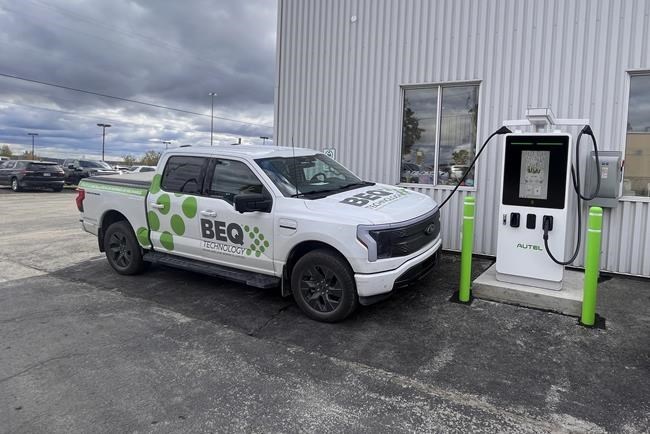Michael Laroche replaced his Ford F-150 pickup truck with its electric twin, the F-150 Lightning, about a year-and-a-half ago.
A Sherbrooke, Que., resident who installs electric vehicle chargers for a living, Laroche says he drives somewhere between 300 and 400 kilometres a day, three to four times a week. After he replaced the combustion-engine pickup with the electric alternative, he says the cost of his operations has dropped significantly.
"I'm charging the truck during the night, for something like 14 to 15 hours to fully charge the truck, and I'm ready to go," Laroche said in an interview.
He said his monthly electric bill, which includes both household consumption and vehicle charging, is now at $350 on average for the last 15 months. The bill may be costly, but a better alternative when compared with Laroche's $450 a week on gasoline – saving him $1,400 a month in fuel costs.
The federal government has set sales targets for new vehicle sales, shifting to electric-only by 2035 – including pickup trucks.
Canadians don't yet have many electric trucks to choose from, with only the F-150 Lightning and Rivian R1T pickups. General Motors and Ram are both expected to join the range in 2024.
Electric pickup trucks are built to efficiently lug heavier weights such as towing or pulling a trailer, similar to gas-powered ones. The gas-guzzling stereotype carries over, too: EV pickup trucks need a big electrical charge.
"Your range will be reduced because the truck is working harder," said Louise Levesque, policy director with Electric Mobility Canada.
"If you're pulling something (on your pickup truck), you're going to burn more gas per kilometre (and) your tank will not bring you as far as it usually would. The same thing is (true) for an electric version," she added.
But higher battery consumption is expected in electric pickup trucks, said Mark Marmer, founder of the electrical contracting business Signature Electric. He said the trucks are designed for heavy lifting, which is different from a passenger EV.
Still, Marmer acknowledged it can be challenging if the driver has to stop more often.
"You have to be aware of the loads (and) thinking about it, 'Have I allowed enough time, do I know which charger I'm going to go (to) if I need it, is it going to get me to my destination properly?'"
Laroche agreed his pickup truck consumes its charge faster when a trailer is attached to his vehicle.
"When I'm driving without the trailer, I'm OK to do the (drive) back and forth from Montreal without charging," he said. From Sherbrooke, that's a round trip of about 300 kilometres. "But when I use the trailer, I need to charge the truck for around 20 to 25 minutes at a fast charger."
The battery size in the truck is bigger than smaller electric vehicles but the range remains the same, Marmer said. "This relates to the size of the vehicle — bigger payload and everything else. So it's not getting any more range but needs a bigger battery."
The latest electric pickup trucks can be cost-prohibitive for those looking to replace their gas counterpart, in part due to the high-end finish and novelty of the make.
Marmer said the electric pickup trucks, despite being pricier for commercial use, are "unbelievably" reliable.
He said EVs in general work with a simple mechanism, compared to a gas or diesel vehicle.
"This simplicity is the vehicle itself and the minimal amount of care it takes to run it is really what's going to make it survive."
This report by The Canadian Press was first published Dec. 29, 2023.
Ritika Dubey, The Canadian Press



